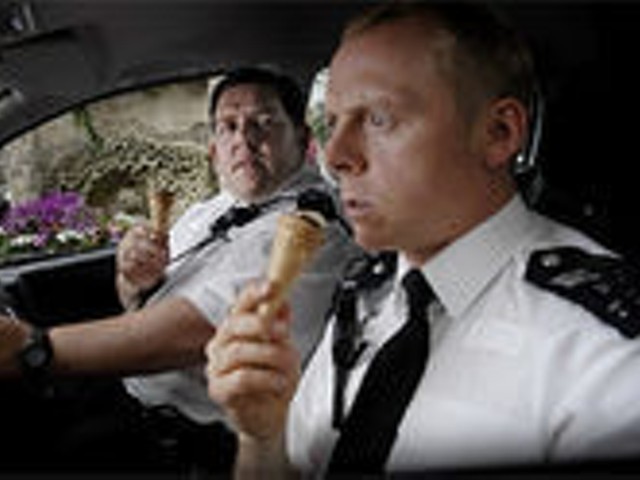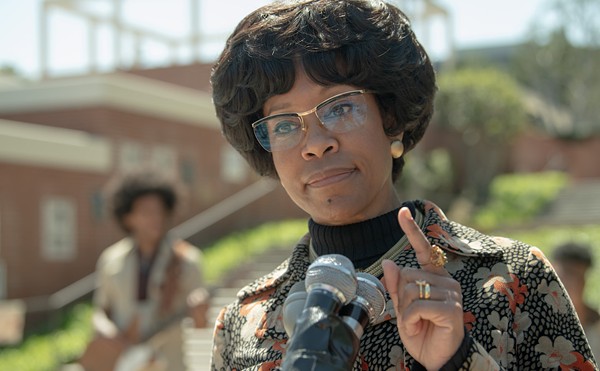It is the year 2057. Approximately five billion years ahead of schedule, the sun is beginning to die. In a desperate attempt to keep the lights on, global resources have been directed toward a solution, presumably with input from Al Gore and the writers of Armageddon. A team of experts will deposit a bomb the size of Manhattan inside the fading light, thus — theoretically — giving birth to a vigorous new star. Given its ominous name (might just as well have called it Fat Chance), it comes as no surprise that the first Icarus expedition failed and then vanished. Enter Icarus II, a fresh crew, and the convolutions of Sunshine, a heady science fiction written by Alex Garland and directed by Danny Boyle.
We begin in the observation room as Searle (Cliff Curtis), the medical officer, converses with the on-board AI in that deep, slumberous monotone common to ponderous outer-space sagas. He requests to view the sun at maximum brilliance, is obliged and staggers out in a state of quasi-religious rapture. Within the sequence, Boyle rhymes the bright circumference with Searle's dazzled corneas. This correspondence of shapes is sustained throughout the film as if in homage to the poet Ronald Johnson, who liked to imagine the eye as an organ evolved by the sun to contemplate itself.
Oh, yes — there will be poetry. As it rockets toward the fate of mankind, Sunshine alerts all passengers that they have boarded a first-class head trip. Big Questions are posed. (What is man's role in the universe? What happens when you stare into the abyss? Is Chris Evans hotter with long hair or short?) Ethical Quandaries are dramatized. (How do you reframe the basic tenets of civilization when faced with its imminent extinction?) There will be ghosts in the machine, signs and miracles, manifestations of the intergalactic sublime. And there will also be a rampage by what appears to be Freddy Krueger in the throes of one seriously gnarly God complex.
Ideas scintillate over the surface of Sunshine without ever quite igniting, but at least the movie sparkles. What it doesn't do is cohere. Action flick, sci-fi thriller, metaphysical adventure, incoherent allegory, ethical hypothesis and horror film all at once, this mad multitasker has the agenda of a dozen movies. Problem is, we know which ones.
Sunshine is a nearly perfect pastiche — every computer glitch, hazardous space walk, navigational gambit and act of mad heroism traceable to the sci-fi canon. These genre tropes are slyly acknowledged when the crew locates, and boards, the mysteriously vacant Icarus. "Afraid we might get picked off by aliens one by one?" they tease each other, and us. That's good for a laugh, but how are we supposed to take things seriously when this is more or less exactly what happens later in the picture?
Funny thing is, Sunshine works despite feeling both over-familiar and over-ambitious. It crescendos with a legitimate sense of wonder (if not profundity) thanks to the luminous and uncanny score by electro legends Underworld. Cillian Murphy heads an ensemble graced with vivid physical presence (Hiroyuki Sanada, Michelle Yeoh), an asset given the dialogue's tendency for sci-fi boilerplate. It is what it is as a movie of ideas, but makes an evocative contribution to the Malfunction Adventure drama.
Stupid things happen in Sunshine — e.g. a finale plagued with redundancy and cheap thrills — yet the movie never feels stupid. Its achievement falls somewhere between a pair of underrated oddballs: Steven Soderbergh's suavely introspective Solaris remake and the earth-drilling disaster flick The Core, a movie rich in pulp abstraction. Boyle plays it safer than both. Neither philosopher nor hack, serious nor ridiculous, he's an able craftsman with a canny sense of timing. Just as Trainspotting spoke to '90's disaffection and 28 Days Later to post-9/11 anxiety, Sunshine suits a climate where the possibility of ecological apocalypse 50 years hence is no longer the stuff of science fiction.





